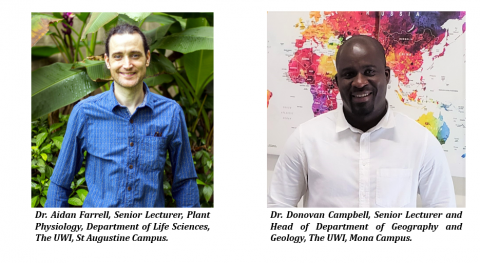
The University of the West Indies’ Dr Donovan Campbell, Senior Lecturer and Head of the Department of Geography and Geology at the Mona Campus and Dr Aidan Farrell, Senior Lecturer in Plant Physiology, Department of Life Sciences at the St Augustine Campus, are among a global network of researchers who have coauthored and published a Global Stocktake of evidence on human adaptation to climate change. The United Nations since 1988 warned that “certain human activities could change global climate patterns, threatening present and future generations with potentially severe economic and social consequences.” Since then, the world has experienced a range of human-induced climate change events, giving rise to extreme weather, multiple hazards and other severe impacts, including on the world’s socioeconomic systems. The critical question is are we on track with climate adaptation efforts to minimise these severe impacts?
The researchers systematically and comprehensively assessed the implementation of human adaptation to climate change as reflected in scientific literature from 2013 to 2020. They evaluated 1,682 articles from more than 48,000 screened. The study found that climate adaptation, as documented in scientific literature, was not comprehensive or coherent across communities and institutions, but was mostly fragmented and incremental being undertaken by individuals and households. The researchers noted that behavioral adjustments by individuals and households were more prevalent than other responses. However, the evidence of how adaptation efforts are reducing risks was negligible.
The study’s lead author, Professor Lea Berrang Ford, Priestley Research Chair in Climate and Health at University of Leeds’ Priestley International Centre for Climate said “Our results provide a warning call: we found very little evidence of widespread and rapid preparedness at a scale that we think is likely to be adequate to avoid severe climate impacts."
Co-author from The UWI, Dr Donovan Campbell noted, “This is the first paper to systematically investigate whether we are on track to adapt sufficiently to climate change. This was a massive undertaking involving more than a hundred global scholars which meant that the analysis benefitted from a wide range of perspectives and experiences. We are encouraged by the range of adaptation actions across communities, nations, and sectors to respond to multiple climate hazards. However, most of these actions were found to be incremental and insufficient to deal with severe climate change impacts.”
He also noted that “Small Island States were well represented in the assessment, and the results can help governments and practitioners across the Caribbean to make evidence-based adaptation decisions.”
The other UWI co-author, Dr Aidan Farrell expressed concern that, “South America and the Caribbean were particularly lacking in information about how well climate adaptation was progressing, despite the fact that many governments have been proactive in establishing institutional support for climate adaptation.”
The UWI researchers observed that an increase in climate hazards has driven behavioral adjustments by individuals and households in Small Island States, for example, where sea level rise and flooding have motivated people to improve inland and coastal flood management infrastructure, implement new building codes and develop hazard maps and early warning systems.
The two UWI academics also see The UWI playing a significant role in climate adaptation efforts, building on its strong background in climate science. The study calls for more coordination in global efforts to adjust to climate change, with a need to urgently identify and disseminate winning strategies.
The study was published in Nature Climate Change Journal, for the 26th United Nations Framework Convention on Climate Change (COP26), held in November in Glasgow, Scotland.

